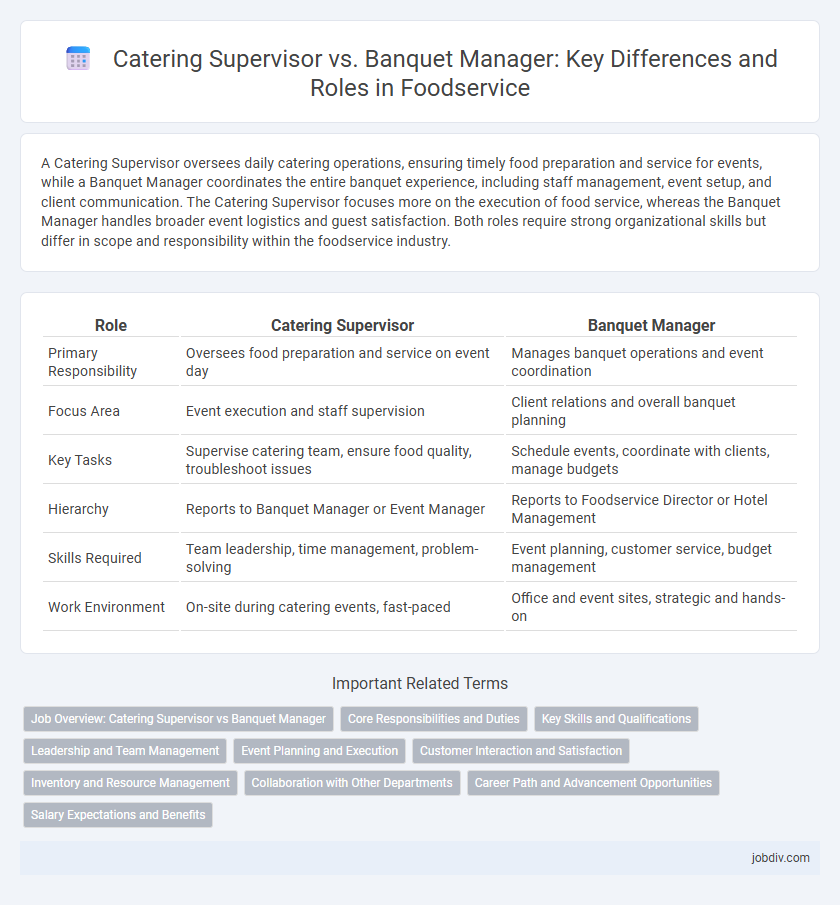A Catering Supervisor oversees daily catering operations, ensuring timely food preparation and service for events, while a Banquet Manager coordinates the entire banquet experience, including staff management, event setup, and client communication. The Catering Supervisor focuses more on the execution of food service, whereas the Banquet Manager handles broader event logistics and guest satisfaction. Both roles require strong organizational skills but differ in scope and responsibility within the foodservice industry.
Table of Comparison
| Role | Catering Supervisor | Banquet Manager |
|---|---|---|
| Primary Responsibility | Oversees food preparation and service on event day | Manages banquet operations and event coordination |
| Focus Area | Event execution and staff supervision | Client relations and overall banquet planning |
| Key Tasks | Supervise catering team, ensure food quality, troubleshoot issues | Schedule events, coordinate with clients, manage budgets |
| Hierarchy | Reports to Banquet Manager or Event Manager | Reports to Foodservice Director or Hotel Management |
| Skills Required | Team leadership, time management, problem-solving | Event planning, customer service, budget management |
| Work Environment | On-site during catering events, fast-paced | Office and event sites, strategic and hands-on |
Job Overview: Catering Supervisor vs Banquet Manager
A Catering Supervisor oversees the coordination and execution of catering services, ensuring seamless food delivery and service quality during events, often managing a team of servers and kitchen staff. In contrast, a Banquet Manager is responsible for the overall planning, organization, and supervision of banquet functions, including client communication, event logistics, and staff management. While both roles require strong leadership and operational skills, the Catering Supervisor focuses more on service execution, whereas the Banquet Manager handles comprehensive event management and client relations.
Core Responsibilities and Duties
A Catering Supervisor oversees the coordination of food preparation and service for catered events, ensuring menu adherence, staff scheduling, and quality control. A Banquet Manager manages the entire banquet operation, including event planning, client communication, staffing, and on-site supervision to guarantee seamless execution. Both roles require strong leadership and organizational skills, but the Banquet Manager typically handles broader event logistics and client relations.
Key Skills and Qualifications
A Catering Supervisor excels in client coordination, menu customization, and staff management to ensure seamless event execution. A Banquet Manager possesses strong leadership in large-scale event logistics, vendor negotiations, and compliance with health and safety regulations. Both roles require excellent communication skills, multitasking ability, and experience in hospitality or foodservice management.
Leadership and Team Management
A Catering Supervisor directs daily operations and coordinates staff to ensure efficient service delivery, emphasizing hands-on team leadership and customer satisfaction. A Banquet Manager oversees large-scale event execution, managing multiple teams and ensuring seamless collaboration to meet client expectations. Both roles require strong leadership, but the Banquet Manager focuses more on strategic planning and cross-departmental communication.
Event Planning and Execution
Catering Supervisors coordinate staff and logistics to ensure smooth food service during events, managing on-site operations and quality control. Banquet Managers oversee overall event planning by collaborating with clients, designing event layouts, and managing budgets to deliver tailored banquet experiences. Both roles require strong leadership and communication skills but differ in scope, with Catering Supervisors focusing on execution and Banquet Managers emphasizing comprehensive event management.
Customer Interaction and Satisfaction
Catering Supervisors directly engage with clients during event setup and execution, ensuring personalized service that enhances customer satisfaction. Banquet Managers oversee the overall banquet operations, focusing on seamless coordination and problem-solving to maintain high service standards. Both roles prioritize guest experience, but Catering Supervisors typically have more hands-on interaction influencing immediate customer feedback.
Inventory and Resource Management
A Catering Supervisor focuses on managing inventory levels to ensure all supplies meet the specific needs of catering events, coordinating closely with vendors and storage teams to prevent shortages and waste. In contrast, a Banquet Manager oversees broader resource management, including staffing schedules and equipment allocation for large-scale banquets, ensuring operational efficiency and compliance with event requirements. Both roles require strong logistical skills but differ in scope, with the Catering Supervisor specializing in inventory control and the Banquet Manager emphasizing overall resource coordination.
Collaboration with Other Departments
Catering Supervisors coordinate closely with culinary, event planning, and service teams to ensure seamless execution of customized menus and client specifications. Banquet Managers collaborate extensively with sales, operations, and banquet staff to manage large-scale events, focusing on overall event flow and guest satisfaction. Both roles require effective communication and teamwork across departments to deliver high-quality foodservice experiences.
Career Path and Advancement Opportunities
A Catering Supervisor typically oversees daily foodservice operations, coordinating staff and managing client needs, which provides foundational experience in team leadership and event logistics. Progression from this role often leads to a Banquet Manager position, where responsibilities expand to include strategic planning, budgeting, and higher-level client relations within larger-scale events. Career advancement opportunities favor Banquet Managers who demonstrate strong organizational skills, financial acumen, and the ability to manage complex banquets, positioning them for senior management roles in hospitality or foodservice operations.
Salary Expectations and Benefits
Catering Supervisors typically earn between $45,000 and $60,000 annually, focusing on coordinating foodservice operations and staff during events, while Banquet Managers command higher salaries ranging from $55,000 to $75,000, reflecting their broader responsibilities in managing large-scale banquets and client relations. Benefits for both roles often include health insurance, paid time off, and employee discounts, but Banquet Managers may receive additional incentives like performance bonuses and profit-sharing due to their leadership position. Salary expectations vary by location, establishment size, and experience, with upscale venues offering more competitive compensation packages.
Catering Supervisor vs Banquet Manager Infographic

 jobdiv.com
jobdiv.com